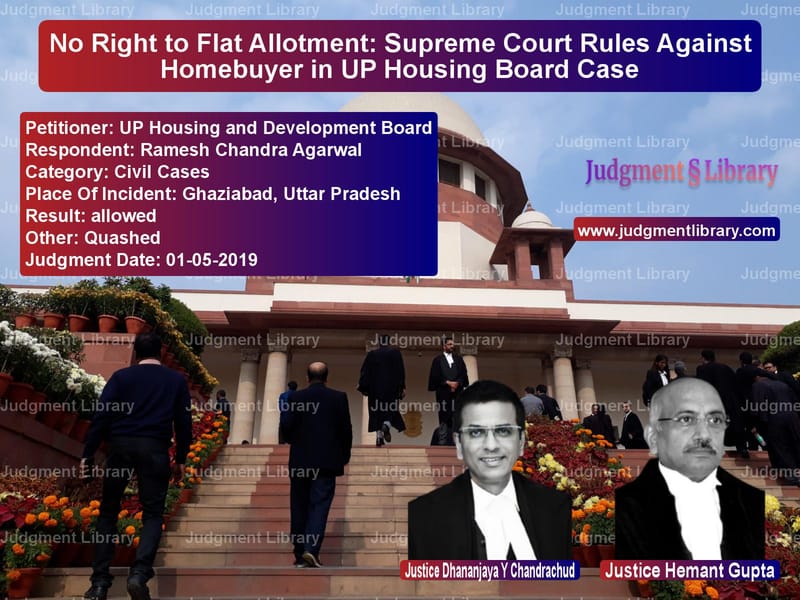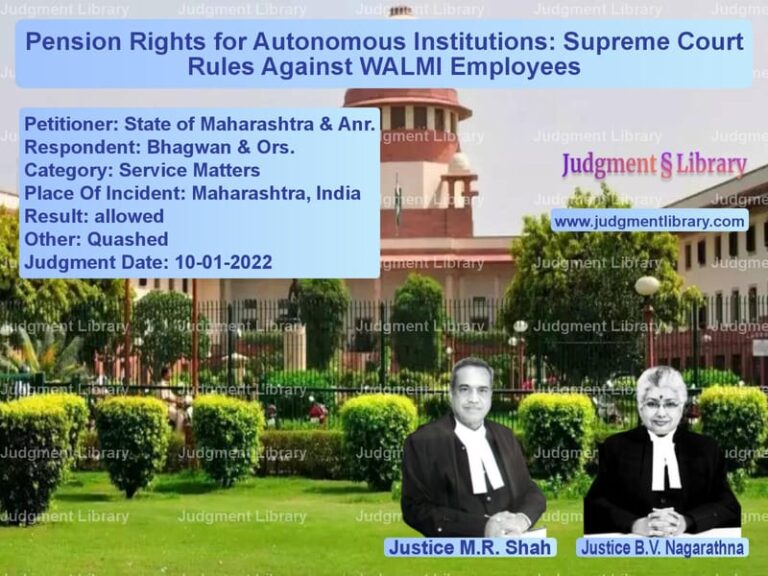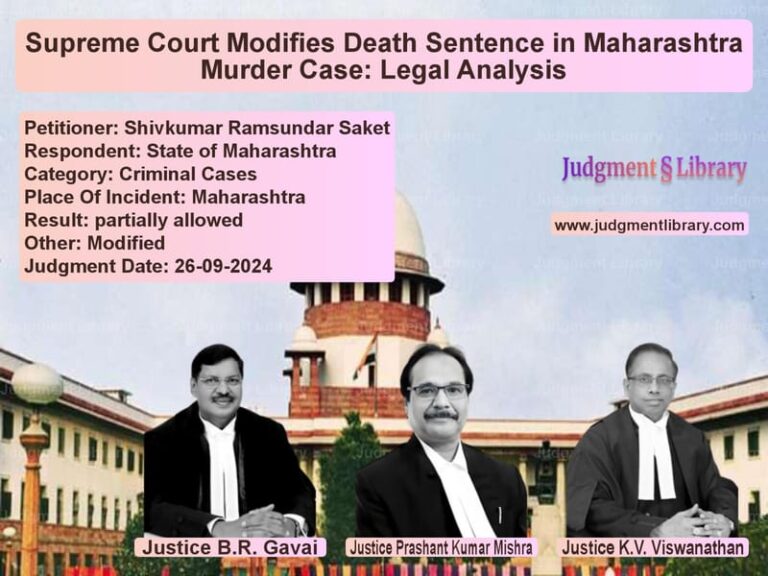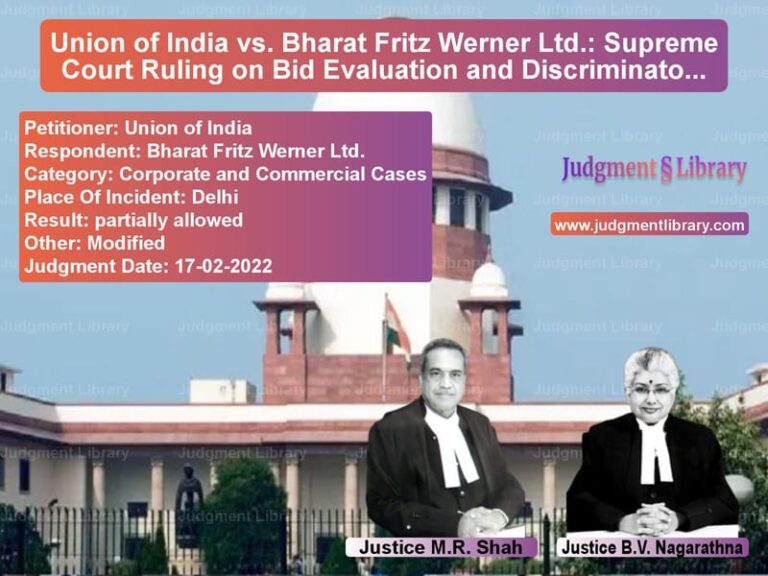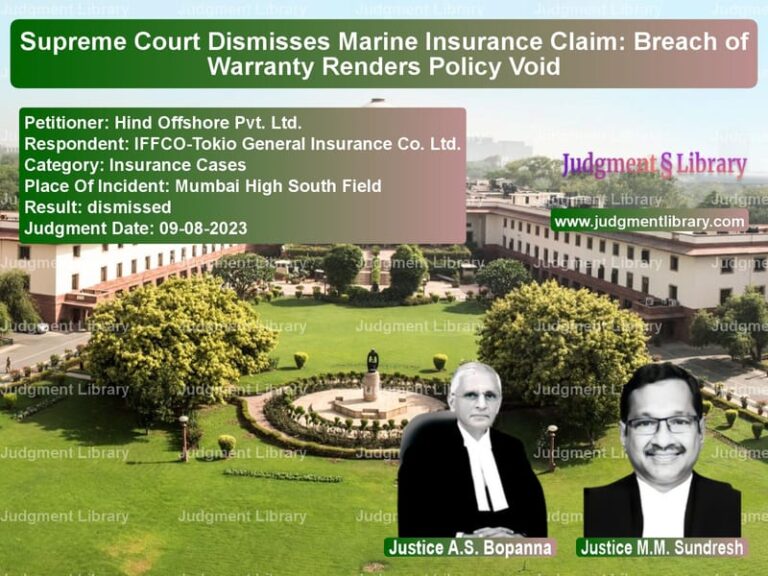No Right to Flat Allotment: Supreme Court Rules Against Homebuyer in UP Housing Board Case
The case of UP Housing and Development Board vs. Ramesh Chandra Agarwal revolves around the dispute concerning the allotment of a flat under the UP Housing and Development Board’s schemes. The Supreme Court ruled against the respondent, holding that mere registration for a housing scheme does not create an absolute right for allotment. The Court set aside the National Consumer Disputes Redressal Commission’s (NCDRC) order that had directed the Board to allot a flat at a fixed price.
The case highlights the legal interpretation of housing board allotments, contract principles, and consumer rights. The Supreme Court emphasized that registered applicants must express their willingness to participate in the allotment draw and cannot demand a flat at outdated prices.
Background of the Case
The UP Housing and Development Board (UP Awas Evam Vikas Parishad) launched a housing scheme in 1982 for the Economically Weaker Sections (EWS). The respondent, Ramesh Chandra Agarwal, registered for the scheme by paying Rs. 500 in 1982 and deposited an additional Rs. 500 in 1985 when the registration fee was increased.
The terms of the Registration Booklet and the 1979 Rules governing the Board clearly stated that registration did not guarantee allotment. Moreover, applicants had to furnish written consent to participate in the draw of lots when properties became available.
The respondent did not apply for any of the advertised schemes and instead filed a consumer complaint in 1993, demanding allotment. The District Consumer Forum ruled that he could secure an allotment at the Board’s current price. However, he pursued further appeals before the State Consumer Disputes Redressal Commission (SCDRC) and later before the NCDRC.
Petitioner’s Arguments
The UP Housing and Development Board, represented by Advocate Vishwajit Singh, argued:
- Registration under a housing scheme does not confer an automatic right to allotment.
- The respondent never expressed interest in participating in the allotment draws announced by the Board.
- The District Consumer Forum’s order permitted the respondent to apply under future schemes at prevailing prices, which he failed to do.
- The NCDRC’s direction to allot a flat for Rs. 2,50,000 in Mandola Vihar Yojana, Ghaziabad, was arbitrary and had no contractual basis.
- The Board, as a public authority, could not be compelled to allot a flat when the respondent had no vested right under the scheme.
Respondent’s Arguments
The respondent, appearing in person, countered:
- He had waited since 1982 for an allotment and had repeatedly inquired with the Board regarding availability.
- The Board failed to communicate available schemes to him properly.
- After such a long wait, he should not be forced to pay current market rates for a flat.
- The NCDRC’s order was just and fair, considering the excessive delay.
Supreme Court’s Analysis
The Supreme Court examined the contractual obligations under the Registration Booklet and the 1979 Rules. Key legal findings included:
- Clause 5 of the Registration Booklet stated that registration did not guarantee allotment.
- Rule 15 of the 1979 Rules clarified that the Board was not bound to allot houses to every registrant.
- Rule 30 required registered applicants to give written consent to participate in draws, which the respondent failed to do.
- The respondent did not avail opportunities to apply for any of the schemes advertised over the years.
- The NCDRC erred in issuing an order that effectively created a contract between the respondent and the Board, where none existed.
Key Judicial Findings
The Supreme Court ruled:
- The respondent had no legal right to demand a flat.
- The NCDRC exceeded its jurisdiction by directing the Board to allot a flat at a fixed price.
- Housing Boards cannot be compelled to allot properties to registrants without following established procedures.
- The appeal filed by the UP Housing and Development Board was allowed, and the NCDRC’s order was set aside.
Conclusion and Impact
The Supreme Court’s decision reinforces that mere registration in a housing scheme does not entitle an applicant to automatic allotment. The ruling protects public authorities from arbitrary directives that could interfere with established policies and financial viability.
The judgment sets an important precedent for housing disputes, ensuring that applicants must follow due procedures rather than expect preferential treatment based on past registrations.
Petitioner Name: UP Housing and Development Board.Respondent Name: Ramesh Chandra Agarwal.Judgment By: Justice Dhananjaya Y Chandrachud, Justice Hemant Gupta.Place Of Incident: Ghaziabad, Uttar Pradesh.Judgment Date: 01-05-2019.
Don’t miss out on the full details! Download the complete judgment in PDF format below and gain valuable insights instantly!
Download Judgment: UP Housing and Devel vs Ramesh Chandra Agarw Supreme Court of India Judgment Dated 01-05-2019.pdf
Direct Downlaod Judgment: Direct downlaod this Judgment
See all petitions in Property Disputes
See all petitions in Consumer Rights
See all petitions in Judgment by Dhananjaya Y Chandrachud
See all petitions in Judgment by Hemant Gupta
See all petitions in allowed
See all petitions in Quashed
See all petitions in supreme court of India judgments May 2019
See all petitions in 2019 judgments
See all posts in Civil Cases Category
See all allowed petitions in Civil Cases Category
See all Dismissed petitions in Civil Cases Category
See all partially allowed petitions in Civil Cases Category

